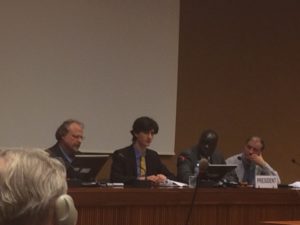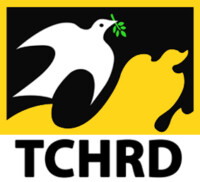
On 21 April 2016, the second talk in the TCHRD’s United States Tibet Talk Series was at the International Campaign for Tibet’s offices in Washington D.C. The first talk in the series was hosted with the Nanda Center for International Law at the University of Denver on 17 February. The most recent conference, “Tibetan Political Prisoners: Rights and Responses” was a panel discussion with ICT’s Andrea Worden and Sophie Richardson from Human Rights Watch and moderated by TCHRD’s John Gaudette.
Andrea Worden, began by describing some overall trends toward repression of human rights in Chinese policies. This included the arrest and continued detention of human rights lawyers, a trifecta of laws, and the government’s emphasis on stability maintenance. Through these policies the Chinese government has restricted rights in the Universal Declaration on Human Rights and the ICCPR, especially the rights involving a prompt, fair and impartial trial in front of an independent judiciary. Looking at the National Security Law, the Counterterrorism Law, the proposed law regulating international non-governmental organisations (NGOs) and other laws, Andrea Worden described how vague laws have made expressing an ideology potentially criminal. As a result, people, like Tashi Wangchuk, have been because promoting Tibetan language can be considered “inciting separatism.” Once political prisoners are arrested they face the risk of rampant torture, the denial medical care, enforced disappearances, and death in detention or an early release on “medical parole” so that they do not die in prison. The second part of Andrea Worden’s talk focused on advocacy strategies. She spoke about the impact of personal stories from victims, including Golog Jigme. These stories not only inspire action abroad but also provide hope to the victims and their families, which can improve the treatment of prisoners in Tibet. The importance of getting access, information, and official documents was highlighted as another powerful source of advocacy. Andrea Worden then spoke about what people can do by reaching out to foreign ministries, providing government officials with briefings when the travel to Tibet or meet Chinese official, and participating in NGO campaigns.
After summarising some of Human Rights Watch’s recent reports on Tibet, Sophie Richardson spoke about a recent Human Rights Watch report on the torture and ill-treatment of ordinary criminals in China. This report was based off of looking at
hundreds of thousands of records available on the Chinese Supreme People’s Court’s webpage. From these data she drew important deductions regarding, among other things, the effectiveness of policies ostensibly designed to prevent torture and the availability of information from the Tibet Autonomous Region.
Of the cases Human Rights Found Watch, 400 involved allegations of torture and mistreatment and evidence was excluded in less than two dozen cases and nobody was ever acquitted after the exclusion of evidence. Sophie Richardson emphasised the importance of enforcing the “exclusionary rule” which prohibits the use of evidence that has been illegally obtained as one of the few checks to ensure that the police follow the law. The power of the police in China prevents meaningful checks on their power. She gave examples of judges who have been forced to change verdicts and the lack of prosecutions of police for torture.
Many of Human Rights Watch’s finding were also raised by the Committee Against Torture’s periodic review of the People’s Republic of China in 2015. Sophie Richardson emphasised the importance of the United Nations mechanisms including the special procedures at the Human Rights Council as the only forum available to victims to have their voice heard. Echoing Andrea Worden’s comments about the importance of individual victims, Sophie Richardson spoke about the added credibility and power individual stories have at the United Nations bodies. Victims have to the UN bodies to publicise what has happened to them even though the risks are large and the chance of receiving a remedy are small.
TCHRD’s John Gaudette, thanked the speaker and made a few brief remarks about the use of human rights litigation against corporation and others for their involvement in the commission of crimes against humanity in Tibet. During the question and answer session there was a discussion of efforts taken by the United States and other governments to influence China’s policy toward Tibet and the treatment of political prisoners. The discussion discussed recent action in the US congress toward passing the Global Magnitsky, which would either allow or require the State Department to freeze the assets of and deny visas to officials responsible for gross human rights violations. It also discussed the Reciprocal Access to Tibet Act, which would impose travel bans on Chinese officials responsible for not allowing journalists, diplomats, and civil society to freely access Tibet. After another question, the conversation moved onto why the United States should be advocating for human rights abroad. The answers focused on the United States’ imperfect record for calling for human rights internationally but how defending human rights abroad has an impact both for the victims of human rights abuses and the United States. This included instances where US policy on Tibet has taken a strong position regarding the treatment of prisoners and receiving the Dalai Lama.
